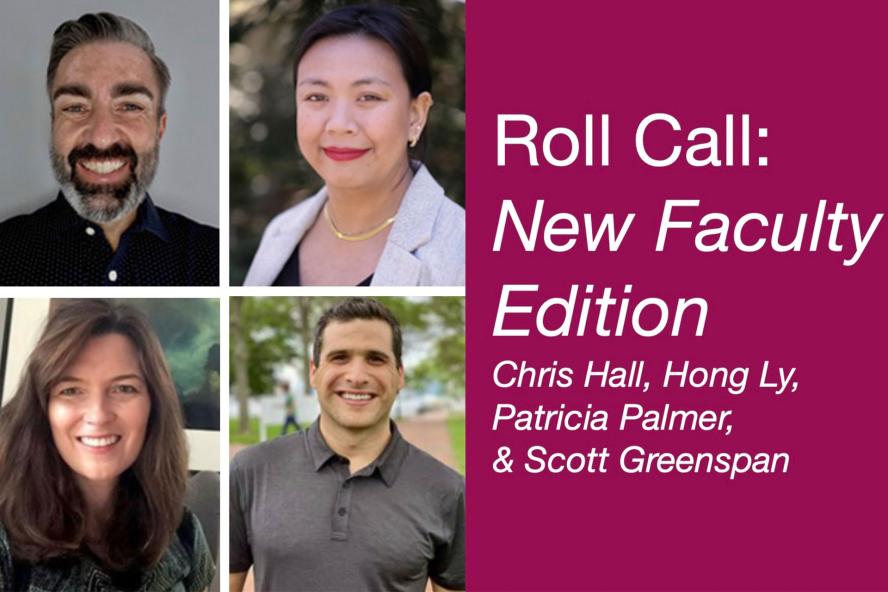Some Insights about Teaching from our New Faculty

Roll Call: New Faculty Edition
A few of our more recent full and part-time faculty touch upon some of the things kindling their passions, practices, and curiosities in and outside of the classroom since being introduced in our September Bulletin. We’re excited to share a little bit more about them in their own words beginning with Chris Hall, Hong Ly, and Scott Greenspan.
What essential questions showed up again and again with your students this past semester? Or which ones do you hope will show up this semester?
Chris:
- How can an understanding of students' diverse support needs and cultural backgrounds inform pedagogical practices in the art room?
Hong:
- How do we normalize the discomfort of learning and taking risks? Specifically for school psychology students in training, but also generally as professionals.
- How do we address imposter syndrome? Can there be a healthy amount of questioning and doubt without feeling inadequate in a way that hinders personal learning and growth?
Patricia:
- The questions that showed up in our art education classes included: How can I connect to my students and understand their experience, especially as they deal with the effects of the pandemic? How do I support my diverse learners? How can I decolonize the curriculum and bring in more contemporary art? These are all questions that I hope stay with us through the spring semester!
Scott:
- How do we adapt and adjust school-based interventions to best support the needs of diverse learners while honoring their lived experiences and identities?
- How can we apply what we know to be "best practices" into school-based work when there seems to be many systemic barriers and roadblocks?
What are some learning and communication strategies you intentionally try to model in your teaching?
Chris:
- I encourage pre-service art educators to look beyond spoken and written language as the primary method of communication in the classroom. This includes using a variety of communication and visual supports to provide multiple ways for students to engage in creative expression and demonstrate artistic intent.
Hong:
- Modeling grappling through issues, using resources, learning, and that knowledge/experience isn’t finite.
- Normalizing the gray areas and sticky spots.
- Pausing to mark moments that impact learning.
- Narrating my experiences and thinking to highlight how differently people approach issues.
Patricia:
- On our class Canvas, students responded to all the readings using thinking routines which allowed them to go deeper into their own thought process while internalizing some of the strategies for developing their own thinking. Students responded in writing or posted video or audio recording. Some students even got together to record “podcasts” where they discussed the readings at length. These responses allowed me greater insight into how students were connecting to the material and let me hear their ideas and voices in new ways.
Scott:
- Bringing my authentic self into the classroom and checking in with students every class to see how they are doing on personal and professional levels.
- I think it’s important for me to model that professionals don't have all the answers. So, there are times when I say, “I don't know, let me get back to you on that” and I try to debunk the myths that educators need to have all the answers all the time.
- I also implement multi-modal instruction to foster unique opportunities to engage with content (e.g., media, counseling role plays, small group discussions).
Who/what have been meaningful models for your teaching?
Chris:
- My teaching is heavily informed by Universal Design for Learning and Culturally and Linguistically Sustaining Practices. This involves honoring and privileging the knowledge base that students bring to the classroom and providing students with differentiated learning experiences.
Hong:
- Bloom’s taxonomy to break down learning.
- Critical race theory to understand how whiteness is centered/normalized in society and systems at the expense of people of color who are racialized and positioned in a deficit model.
- Intersectionality (rooted in Black feminist thought) to honor and recognize multidimensional understandings of individuals’ experiences with oppression and privilege.
Patricia:
- In my work, am often reminded of my mentors from my own art ed licensing program long ago at Bank Street/Parsons in NYC. My professors, Carol and Bettina, worked as a team and modeled empathy, connection, and innovation in the art room. I often reflect on their commitment to thoughtful placements, a focus on teachers as artists, and the ways they built community in the program and aim to bring the same level of passion for learning and teaching to my current practice.
Scott:
- Cultural humility: Upholding a genuine curiosity openness to learning about students’ identities and lived experiences. I engage in consistent self-reflection of my own positionally and an openness to exploring ways in which power dynamics in the classroom/university setting may impact learning.
- Multi-tiered systems of support: I truly believe that every student CAN learn and apply content into their practice. However, it may be the case that I need to adjust my own teaching or provide more differentiated instruction to support the learning of students.
- I often think about two of my clinical supervisors who got to know me on a personal level and showed such genuine care and support of my learning. I also appreciated their directness and genuineness.
What's something outside of your discipline that has kindled your curiosity?
Chris:
I am an avid camper and enjoy traveling cross-country with my family visiting National Parks and National Historic Sites. I am very much curious about what exists beyond the beaten path.
Hong:
- I have been obsessively reading novels written by POC about diasporic experiences (and rom com books…)
Patricia:
- Currently I am fascinated by ChatGPT. I am curious about how it will change education and how it might become a useful tool for artists, students, and teachers.
Scott:
- I exercise every day, and through this time I develop a sense of calm and a new perspective or intention for the day.
- I LOVE to learn (I know, no surprise there). If you were to review my Spotify account, you would see Podcasts on a myriad of topics ranging from: The history and humble beginnings of various companies, the future of the tech industry, and stand-up comedy.
Chris Hall will be teaching EDS-0122: Art Education with Special Populations this spring.
Hong Ly will be teaching ED 0221 First Year Seminar in School Psychology Practice this spring.
Patricia Palmer will be teaching EDS 173: Student Teaching in Art PreK-8, EDS 176: Art Education Curriculum in PreK-8, and EDS: 178 Art Ed Curriculum in 5-12 this spring.
Scott Greenspan will be teaching ED-0232 Practice in School Psychology and ED 0246 Social, Emotional, and Behavioral Assessment this spring.
